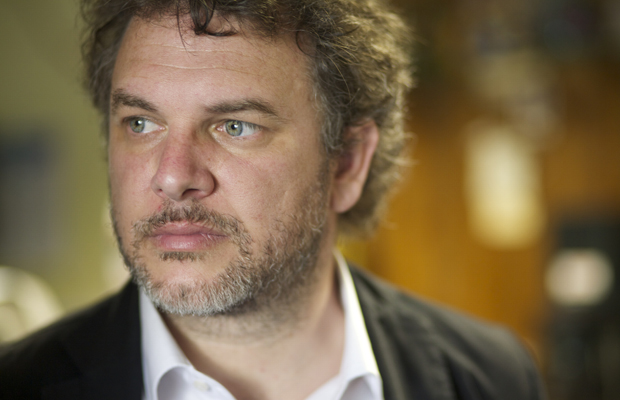11 Dec 15 | Asia and Pacific, Campaigns, Malaysia, mobile, Statements
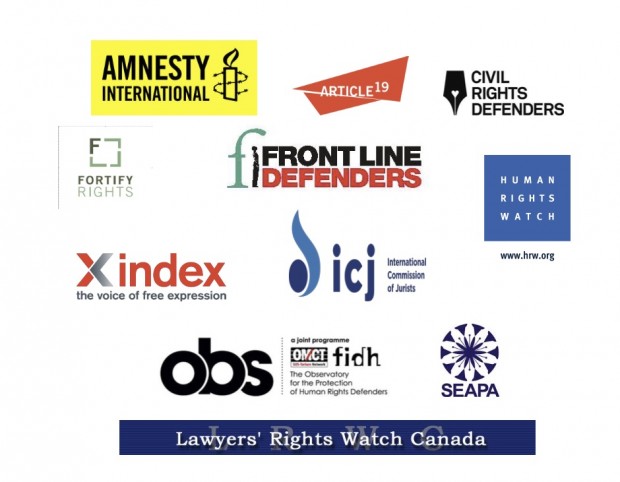
Dear Attorney General Mohamed Apandi Ali,
We write to you as organisations that are deeply concerned by the decision of the Malaysian authorities to prosecute Lena Hendry for her involvement in the screening of the award-winning human rights documentary, “No Fire Zone: The Killing Fields of Sri Lanka,” in Kuala Lumpur on July 9, 2013. The charges against her violate Malaysia’s obligations to respect the rights to freedom of opinion and expression, notably to receive and impart information. We respectfully urge you to drop the charges against Hendry. Her trial in Magistrate Court 6 in Kuala Lumpur is slated to begin on December 14, 2015.
As you know, Hendry is being charged under section 6 of the Film Censorship Act 2002, which imposes a mandatory prior censorship or licensing scheme on all films before they can be screened at any event, except films sponsored by the federal government or any state government. If convicted, she faces up to three years in prison and a fine up to RM 30,000.
The prosecution appears intended to restrict the activities of Hendry and members of the KOMAS, the human rights education and promotion organisation with which she works, by hindering their efforts to provide information and share their perspectives on human rights issues.
International human rights law and standards, such as found in article 19 of the Universal Declaration of Human Rights, states that “everyone has the right to freedom of opinion and expression; this right includes freedom to hold opinions without interference and to seek, receive, and impart information and ideas through any media and regardless of frontiers.”
Malaysia has committed to ensuring that all human rights defenders are able to carry out their activities without any hindrance or fear of reprisals from the government. In November, Malaysia voted in favor of a resolution on “Recognizing the role of human rights defenders and the need for their protection” in the 3rd Committee of the United Nations General Assembly. The resolution set out the urgent need for governments to protect human rights defenders worldwide. Article 1 of the UN Declaration on Human Rights Defenders, adopted unanimously by the UN General Assembly on December 9, 1998, states that “everyone has the right, individually and in association with others, to promote and to strive for the protection and realization of human rights and fundamental freedoms at the national and international levels.” Article 12(2) provides that the government shall “take all necessary measures to ensure the protection by the competent authorities of everyone, individually and in association with others, against any violence, threats, retaliation, de facto or de jure adverse discrimination, pressure or any other arbitrary action as a consequence of his or her legitimate exercise of his or her rights.”
In addition to dropping the charges against Hendry, we also urge you, as attorney general, to seek to repeal provisions of the Film Censorship Act 2002 that allow unnecessary and arbitrary government interference in the showing of films in Malaysia. This policy denies Malaysians the opportunity to benefit from a range of viewpoints on issues of importance to Malaysian society and that affect Malaysia’s role in the world.
Sincerely,
Brad Adams
Director, Asia Division
Human Rights Watch
Gail Davidson
Executive Director
Lawyers’ Rights Watch Canada
Jodie Ginsberg
Chief Executive
Index on Censorship
Karim Lahidji
President
International Federation for Human Rights (FIDH)
Mary Lawlor
Director
Front Line Defenders
Edgardo Legaspi
Executive Director
Southeast Asian Press Alliance (SEAPA)
Marie Manson
Program Director for Human Rights Defenders at Risk
Civil Rights Defenders
Champa Patel
Interim Director, South East Asia and Pacific Regional Office
Amnesty International
Amy Smith
Executive Director
Fortify Rights
Oliver Spencer
Head of Asia
Article 19
Gerald Staberock
Secretary General
World Organization Against Torture (OMCT)
Sam Zarifi
Regional Director for Asia and the Pacific
International Commission of Jurists
Cc:
Ahmad Zahid Hamidi, Minister of Home Affairs
Joseph Y. Yun, Ambassador of the United States of America to Malaysia
Luc Vandebon, Ambassador of the European Union to Malaysia
Victoria Treadell, British High Commissioner to Malaysia
Christophe Penot, Ambassador of France to Malaysia
Holger Michael, Ambassador of Germany to Malaysia
Rod Smith, Australian High Commissioner to Malaysia
Judith St. George Canadian High Commissioner to Malaysia
Dr John Subritzky, New Zealand High Commissioner to Malaysia
Ibrahim Sahib, Sri Lanka High Commissioner to Malaysia
11 Dec 15 | Azerbaijan, Azerbaijan Statements, Campaigns, Europe and Central Asia, mobile
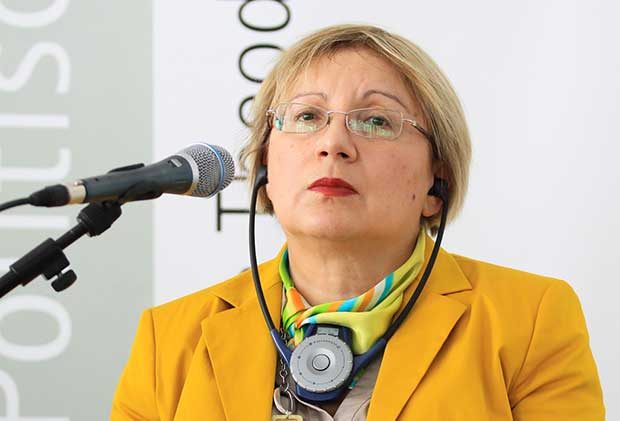
Leyla Yunus (Photo: Human Rights Watch)
We — members of the Civic Solidarity Platform and the Sports For Rights Campaign — were relieved to learn that one of Azerbaijan’s most well-known political prisoners, Leyla Yunus, was released from detention yesterday and that that the Baku City Court of Appeal changed her sentence and that of her husband Arif into suspended sentences of 5 years, on probation. However, most of the charges against the couple have not been dropped and, while on probation, Leyla and Arif Yunus will not be able to leave the country. We remain seriously concerned about the state of health of Leyla Yunus, who has been diagnosed with diabetes and hepatitis C, and that of Arif Yunus, who suffers from high blood pressure. There are doubts that adequate medical assistance can be provided to Leyla Yunus in Azerbaijan.
As part of the ongoing civil society crackdown in Azerbaijan, Leyla and her husband Arif were arrested in late July and early August 2014, respectively. On 13 August 2015, they were convicted on charges of large‑scale fraud and tax evasion. Leyla was sentenced to 8.5 years in prison and Arif to 7 years. While in detention, they were humiliated by police officers, put in overcrowded cells, beaten several times and deprived of much needed medical treatment. On 13 November 2015, Arif Yunus was released under house arrest on health grounds. When ruling to change the sentences, the court of appeal dropped the charges of forgery, but retained others. The court also lifted the order to seize the house owned by the couple.
We, members of the Civic Solidarity Platform and the Sports for Rights Campaign, consider the new developments in the case of Arif and Leyla Yunus to be positive and a first step in the right direction. However, we continue to call for all charges against the couple to be dropped. Leyla Yunus requires an urgent medical examination and she should be granted the right to receive medical treatment abroad if necessary. Arif Yunus must also be provided with swift and adequate medical assistance.
Leyla and Arif Yunus are not the only political prisoners in Azerbaijan. Dozens of other civil society activists, human rights lawyers and journalists remain in detention or prison in Azerbaijan solely due to their professional activities and the peaceful and legitimate exercise of their fundamental rights and freedoms. They should be immediately and unconditionally released. The Azerbaijani government must respect its commitments before its own people, as well as its obligations under international human rights law.
Signed by:
Analytical Center for Interethnic Cooperation and Consultations
Article 19
Association UMDPL
Bulgarian Helsinki Committee
Baris Zvozkau Belarusian Human Rights House
Center for Civil liberties
Center for the Development of Democracy and Human Rights
Crude Accountability
Freedom Files
Helsinki Committee for Human Rights in Serbia
Helsinki Foundation for Human Rights
Human Rights House Foundation
Human Rights Monitoring Institute
Human Rights Movement “Bir Duino-Kyrgyzstan”
Index on Censorship
International Federation for Human Rights (FIDH)
International Partnership for Human Rights
Kazakhstan International Bureau for Human Rights and Rule of Law
Kosova Rehabilitation Centre for Torture Victims
KRF Public Alternative
Legal Transformation Center
Moscow Helsinki Group
Netherlands Helsinki Committee
Norwegian Helsinki Committee
Nota Bene
Promo LEX
Public Verdict Foundation
SOVA Center for Information and Analyses
Sports For Rights
Swiss Helsinki Committee
World Organization against Torture (OMCT)
11 Dec 15 | Italy, Mapping Media Freedom, mobile, News and features
For weeks, Rome has been transfixed by the spectacle of the “Capital Mafia” trial, which began on 5 November. The prosecutors are laying bare an alleged network of corrupt relationships between politicians and criminal syndicates in the city. The scandal involves the misappropriation of funding that was destined for city services, according to prosecutors.
But the biggest surprise wasn’t in that “Captial Mafia” courtroom, it was at the district attorney’s office where a complaint filed by the criminal lawyers association denounced 97 journalists for violating the secrecy of investigations, which is a crime under article 114 of the country’s code of criminal procedure. Italy’s foremost and well-respected crime and courts reporters, as well as 24 chief editors, also stand accused of breaching the ethical norms of their profession.
The accusations against the journalists and editors stem from two waves of arrests — December 2014 and June 2015 — of defendants in the “Captial Mafia” trial. The coverage of the arrests and subsequent investigations generated 278 articles across 14 Italian newspapers. The published reports included details gleaned from arrest warrants of 81 people, including politicians, public administrators and alleged members of the mafia. The contents of the warrants were known to the police, prosecutors, the accused and their lawyers, but still formally subject to publication limits until the conclusion of investigations.
The lawyers that made the accusations believe that the journalists should have rigidly respected the limits and that the facts should not have been reported even if they were known to the parties involved.
Supporters of the journalists maintain that the case is too important and that it is vital for newspapers and journalists to inform Italians as fully as possible, especially in connection with a scandal of such vast proportions. Some see it as a form of legal intimidation that cannot be punished and a move to force the case against the defendants to be dismissed in the public mind as a journalistic fiction.
“We are facing a clear attempt to muzzle the press and the journalists. The journalists denounced have reported news that were not covered by the code,” Raffaele Lorusso, general secretary of National Federation of the Italian Press (FNSI), told Index on Censorship. “It is as if these lawyers want to tell to journalists: “Do not write more news concerning our direct beneficiaries otherwise you will be sued.”
One of the defendant’s lawyers denigrated Lirio Abbate, an investigative journalist and 2015 Index on Censorship Journalism Award nominee, who reported mafia activities. For his trouble, Abbate lives under 24-hour police protection due to death threats.
Currently, the decision to pursue charges against the journalists rests with the Court of Rome. Those involved could potentially face trial and a disciplinary penalty.
Mapping Media Freedom
Click on the bubbles to view reports or double-click to zoom in on specific regions. The full site can be accessed at https://mappingmediafreedom.org/
|
10 Dec 15 | mobile, News and features, United Kingdom
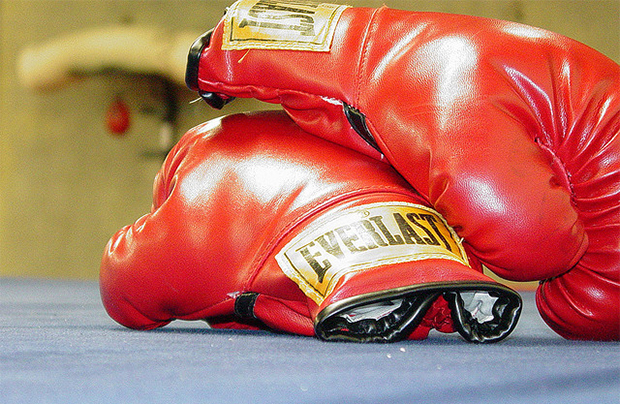
Credit: Flickr/Kristin Wall
Pity poor Tyson Fury.
No, wait, don’t. He’s heavyweight champion of the world and doesn’t seem particularly bothered what you or I think. He was born to box and is now at the top of his game, even if it is a game that has become less and less interesting, compelling and competitive in the last two decades.
Anyone who watched Fury beat Wladimir Klitschko on 28 November will struggle to remember anything about the fight. My word it was dull. Heavyweight boxing can be lumbering at the best of times, but this was beyond pedestrian. “Attritional” suggests a ferocity of combat that was entirely absent.
Nonetheless, Fury won, fairly and squarely. His uncle/trainer Peter Fury laughably compared the underdog victory to Muhammad Ali’s victory over Sonny Liston in 1964, proving, if nothing else, that boxing’s reference points are remarkably limited.
As a British world heavyweight champion, it is only to be expected that Fury should be nominated for the BBC’s Sports Personality of the Year Award. The problem is that Fury’s personality, or more exactly his opinions, ain’t exactly national hero standard. Fury claims that the apparent triumvirate of homosexuality, paedophilia and abortion will lead to the imminent apocalypse. This information, he says, is written in the Bible (where, exactly, remains unclear).
He also says the place of a woman is in the kitchen and on her back. He has offended many by suggesting that genuine national sporting hero, Jessica Ennis Hill, “looks fit in a dress”. This is obviously true in all senses but is the exact kind of objectification that has demeaned women’s sports for years, from Sepp Blatter’s suggestion that women footballers should wear tighter shorts to the annual drooling over women at Wimbledon.
Fury has faced criticism for all these views and come out, well, fighting. He has described the tens of thousands who have signed a petition calling for him to be dropped from Sports Personality of the Year as “wankers” and said his rivals in the competition have no personality to speak of.
This last comment reveals how the BBC is hoist by its own petard. Sports Personality Of The Year is a curious competition: the demands that the British public make of sportspeople make the Vatican’s canonisation processes seem a doddle. For years, Andy Murray, the greatest male tennis player the UK has produced since the 1930s, was criticised for not smiling enough. Sportspeople are simultaneously criticised for being pampered children and for speaking their minds. SPOTY’s name suggests it rewards not only accomplishment but also character. British sport and the BBC still retain the Corinthian ideals of the public school playing fields.
But in spite of the best efforts of Michael Gove while he was education secretary, character and personality mean different things now. Think of everyone you’ve ever met who has been described as a “character” or a “real personality”. Think of every person you’ve met who defends their crass emissions with the phrase “I’m a really honest person”.
Tyson Fury is all those people times one hundred and with fists the size of sledgehammers. He’s Dapper Laughs with a world title. This for him is character and personality.
Peter Fury’s post-fight allusion to Muhammad Ali was entirely deliberate but entirely wrong. When some people see Ali, they see a loudmouth being praised for being a loudmouth. Loudmouths have been part of boxing for a long time, with fight build ups frequently resembling melodramatic soap operas.
Ali was certainly a loudmouth, but he was also a sharp mind and a supremely talented boxer: he could back up the patter. Moreover, his schtick was tied to a new, confident assertion of black identity during the civil rights movement.
This is the small tragedy of Tyson Fury: the self-styled “Gipsy King” is a member of the last minority on these islands who have no one to speak for them. He is the product of a settled Traveller family. In a world where the best this community can expect in mainstream representation is the prurient gawping of Channel 4’s “My Big Fat Gipsy Wedding”, it would be nice for Travellers to have a positive role model. Speaking on Radio 5 Live, Josie O’Driscoll, a volunteer with the Traveller Movement, suggested that if Fury wants to be King of the Travellers then he should “get down off his throne” and talk to LGBT Travellers.
In an ideal world, maybe: but this carries its own problems. In the civil rights era of Ali, this was addressed with reference to Sidney Poitier’s character in Guess Who’s Coming to Dinner, the story of a white middle-class girl bringing her African-American boyfriend to meet her conservative parents. Poitier’s character was perfect: charming, professional, erudite, intelligent… inadvertently, and through no fault of Poitier’s, the message was that if a black man in a white society was in every other sense unobjectionable, then he might be accepted. The rise of the raucous, sexy, gun-toting ghetto heroes of the Blaxploitation era was in part a reaction to the rigidity of the upright, virtuous black characters in well-meaning films of the early 60s, cast as an unapologetic blackness.
So is it entirely fair on anyone to force Fury into the position of role model, whether for the Traveller community or the British people at large? It doesn’t seem to be a position he embraces himself. Far from it, he clearly sees his uglier views as part of his schtick. As with Katie Hopkins, or Donald Trump, there’s only so far the “controversial” routine can take you.
At the time of writing, Fury is being investigated by police for his comments. A prosecution would be ridiculous, and only vindicate Fury’s tweeted assertion that “We only live in a democratic world when it suits everybody else”.
Sports fans play our part in encouraging the drama, the schtick, the anger and the rage, and boxing fans more than most. Only the most ferocious dullard would demand that sports coverage and sports talk should be confined to what happens on the pitch or in the ring. But sports fans are also essentially fickle: we enjoy the controversy until we don’t. And then we take our ball home.
This is the essential dilemma at the heart of our obsession with sport: we imagine sporting endeavour as something sublime, and imagine that the gifted athlete must also be pure in thought and deed. We may need to grow up and stop searching for heroes, but try telling the ancient Greeks that. We’ve had thousands of years to get over that particular need and show no signs of doing so. But we could, at least, learn that we won’t make boxing, Tyson Fury or the lives of LGBT people any better by insisting the heavyweight be silenced.
09 Dec 15 | Campaigns, mobile, Statements
Index on Censorship opposes the proposal to ban Donald Trump from entering the UK.
“Donald Trump should not be banned from entering the UK. The best way to tackle views with which you disagree, including bigoted ones, is to allow discussion about them to take place so they can be openly countered. If you feel people’s arguments are hateful then the best way to expose that is in debate. Banning people just adds to their status and often increases their profile, and makes the arguments more popular. It does nothing to eradicate those views,” Index CEO Jodie Ginsberg said.
08 Dec 15 | Belarus, Mapping Media Freedom, mobile, News and features
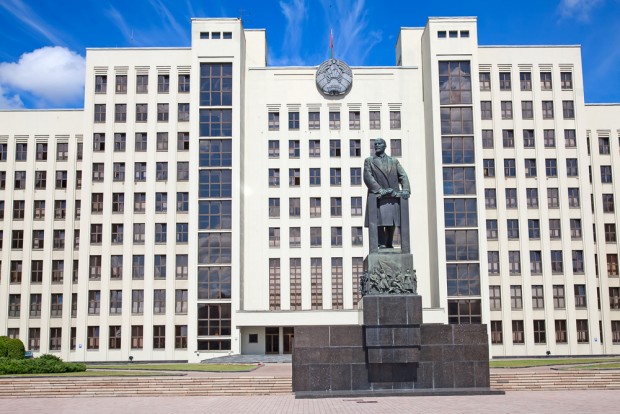
Credit: Shutterstock / Fedor Selivanov
Miklos Haraszti, the UN Special Rapporteur on Human Rights in Belarus, has called for reforms to the country’s laws and practices that for two decades have stifled freedom of expression.
“Critical opinion and fact-finding are curtailed by the criminalisation of content that is deemed ‘harmful for the State’; by criminal defamation and insult laws that protect public officers and the president, in particular, from public scrutiny; and by ‘extremism’ laws that ban reporting on political or societal conflicts,” Haraszti said in a 6 November statement.
Belarus anti-extremism law came into force in 2007. According to Article 14 of the Law On Countering Extremism, it is prohibited to publish and or disseminate extremist materials, even through the media. Information products propagandising extremist activities can be seized by the decision of state security services, law enforcement agencies, prosecutor’s office or courts. If deemed extremist, the court can order the materials be destroyed.
The threat for free speech lies in the broad definitions of “extremist activities” and “extremist materials”. Under Belarusian law, extremist activities include “degrading of national honor and dignity”. Such provisions are contrary to international standards of freedom of expression.
“Unfortunately, this is one of the indicators of the current legislation of Belarus – the absolute vagueness of definitions and the absolute possibility of law enforcement to interpret them as they want,” Andrey Bastunets, chairperson of Belarusian Association of Journalists, said.
Critical materials regarded as extremist can end up banned. In 2011, the Ministry of Information issued a warning to Autoradio for broadcasting a message “containing calls for extremist activities”. The warning concerned a phrase by Andrei Sannikau, candidate for the presidency in 2010, that “the fate of the country is solved in the square, not in the kitchen”. The Supreme Economic Court and the National Commission on Broadcasting upheld the warning and the radio was stripped of its frequency.
The law has led to frequent seizures of imported printed material and videos by Belarusian customs offices. Usually, the seized materials are examined to determine if the items are extremist, but it is unclear how to properly get any property out of impound. Often the rightful owners are forced to repeatedly ask for the return of their material.
One of the most sensational cases related to “countering extremism” was the recognition of Belarus Press Photo 2011 album as extremist materials in 2013. The album contained images that won in 2011 the National Press Photo contest — an open annual contest of press photography. In November 2012, 41 copies of the album were seized for expert examination at the border with Lithuania border from three photojournalists, who were organisers of the contest.
Then the Belarusian KGB’s Hrodna regional department initiated proceedings to categorise the album as extremist material. Ashmiany District Court decided that the publication under consideration was extremist. The court’s decision was based on the KGB’s report that “the choice of the photos for the photo album in the aggregate reflects only negative sides of the life of the Belarusian people, together with the author’s own insinuations and conclusions, which, with the view of the socially accepted norms and morals, insults the national honor and dignity of citizens of the Republic of Belarus, diminishes the authority of the state power organs, undermines the trust of foreign states, foreign and international organisations to them.”
As a result, the seized copies of the album were ordered to be destroyed. Further, the court decision served as grounds to withdraw the license from Lohvinau, the publisher of the album. At least 17 anti-extremism motivated seizures of publications have been carried out by Belarusian customs officers since then.
In 2014, the National Commission of Experts on Assessment of Information Productions Regarding Extremist Contents was established as a permanent body with regional subcommissions set up in the regions. Two-thirds of the National Commission’s members are state officials — including representatives of the KGB and customs — who often initiate proceedings to recognise a material as extremist. In the first six months of its existence, the National Commission considered over 100 different publications, 25 of which have been recognised as extremist.
In November 2015, Belarusian customs officers seized two publications for expert examination.
On 10 November 2015, Oleksandr Doniy and four other Ukrainian TV journalists were interrogated and searched by Belarusian officers at the Ukraine-Belarus border while traveling by car to Vilnius, Lithuania. The journalists, who were working for the cultural programme Last Barricade, were held for five hours. A total of 22 items were seized, including five copies of a documentary about the Ukrainian Revolution (1917-1921) and 11 books, among them Confession From a Condemned Cell, Marshal Zhukov and Ukrainians During World War II. The Ukrainian journalists have been accused of importing “extremist literature and audio productions”.
On 19 November 2015, a number of human rights books were seized by customs officers from Aliaksandr Hanevich who was returning to Belarus from Lithuania. Those were De-facto Implementation of International Human Rights Standards: The Experience of Belarusian ILIA Program Alumni, Enlightened by Belarusianness by Ales Bialiatski, My Fight by Valery Hrytsuk, The Death Penalty in Belarus and Pervasive Violations of Labor Rights and Forced Labor in Belarus.
Besides the anti-extremism law, the grounds for stifling freedom of speech are contained in the Law On Mass Media. In the beginning of 2015, the new Article 51.1 was incorporated that set the procedure for restricting access to online information resources. It can be carried out extrajudicially by the decision of the ministry of information upon the request of any state body if the online resource disseminates information prohibited by law. The law also prohibits propaganda of extremist activities. Blocking websites can follow only one violation of the law, within three months since it occurred. This concerns access to both Belarusian and foreign websites viewed in Belarus.
In 2015, the ministry of information has restricted access to 40 websites, 11 of them have been blocked for disseminating extremist materials.
Mapping Media Freedom
Click on the bubbles to view reports or double-click to zoom in on specific regions. The full site can be accessed at https://mappingmediafreedom.org/
|
07 Dec 15 | Europe and Central Asia, Mapping Media Freedom, mobile, News and features, Russia
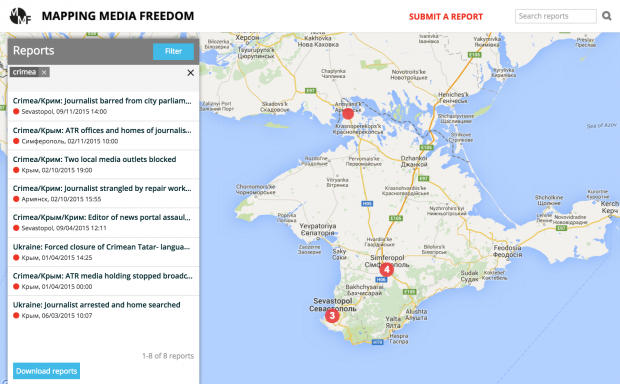
Russia’s takeover of Crimea has been accompanied by an ongoing process that is shrinking the space for media and freedom of speech on the peninsula. As the clampdown progressed, a majority of the independent journalists either left the disputed territory or stopped openly criticising Russian policy. At the same time, the number of alternative sources of information declined significantly.
Russian and Crimean authorities have used red tape, paramilitary violence and threats to silence independent voices and media. They have stifled freedom of information and jeopardised journalist safety.
Journalists and media professionals dubbed Crimea “fear peninsula”.
Curtailing broadcast TV

As Russia took over, television stations opposed to the annexation were one of the first targets. In March 2014, Chornomorska, the largest local TV and radio company, and all Ukrainian stations had their analogue broadcasts terminated. This was followed two months later, in June 2014, by the dropping of Ukrainian cable TV channels in some cable networks.
Applying Russia’s extremism law in Crimea
Soon after the annexation, Russia began implementing its overly broad and vague 2002 law, On Countering Extremist Activity, which led to a surge in warnings against the media. In summer 2014, Shevket Kaybullaev, the editor-in-chief of the Crimean Tatar newspaper Avdet , was summoned to the office of public prosecution in Simferopol. Kaybullaev was interrogated because of a complaint against the paper that challenged coverage of the mood of the Tatar community in the run-up to local elections. The complainant accused the paper of “radicalism and extremism”.
Verbal accusations against journalists have also become day-to-day practice. The Russian Federal Security Service (FSB) and prosecutor’s offices demanded the removal of “extremist materials” from media outlets. Crimean Tatar TV channel ATR received two warnings about the “violation of legislation aimed at countering extremist activity”. The station management was reminded that the formation of an anti-Russian public opinion could be considered a violation of the extremist law.
Criminal penalties for “incitement to separatism”
On 9 May 2014, amendments were made to Russia’s Criminal Code. A new article, 280.1, states that “public calls for action aimed at violating the territorial integrity of the Russian Federation” is punishable by up to five years imprisonment. The words “annexation” and “occupation” are de facto banned in Crimea when referring to recent events.
The amended code has been used to target Crimean journalists. In March 2015, two journalists, the Center for Investigative Journalism’s Anna Andrievska and Natalia Kokorina, had their apartments searched. Kokorina was interrogated for six hours. The FSB opened the criminal case against Andrievska on charges of “incitement to separatism” based on her reporting on individuals providing support for the Crimea volunteer battalion fighting in Donbas, in eastern Ukraine.
Searches and seizure of property
Russian authorities are using searches and property seizure as a way to intimidate and pressurise media companies. In August 2014, the work of Chornomorska TV and Radio Company and the Center for Investigative Journalism were blocked after the seizure of their broadcasting equipment. The broadcaster wasn’t able to retrieve its equipment until five months later.
In September 2014, a search was conducted at the office of the Mejlis of the Crimean Tatar People, a representative body for the ethnic group. Because it shares the building with the Mejlis, the offices of the Avdet newspaper were also raided. Following the probe, the paper was ordered to vacate its offices within 24 hours.
In January 2015, a search was carried out at the ATR TV channel, which disrupted the station’s broadcasts and prevented newsroom staffers from reporting.
Using paramilitaries to put pressure on journalists
Paramilitary groups have also been used to target journalists. So-called Crimean self-defense groups have been found to have illegally detained, assaulted and tortured journalists, as well as confiscations of and damage to property. From 15 to 19 May, 2014, ten cases of journalists’ rights violations were recorded and documented by the Crimea Field Mission on Human Rights. The situation has been worsened by the fact that to date not all the documented attacks on journalists by self-defense group members have been investigated by Crimean authorities. This has created an atmosphere of fear and impunity.
Problems with registration and re-registration of Crimean media
After the Russian annexation, Crimean authorities demanded that all active media outlets re-register according to Russian legislation. As a result, mass media that was considered disloyal — including News Agency QHA and TV Channel ATR, among others — did not receive legal permission to continue their work on the peninsula. In February 2015, all Crimean independent radio companies were silenced after losing their frequencies during a bidding process that was carried out opaquely. Beginning on 1 April 2015, the Federal Service for Supervision of Communications, Information Technologies and Mass Communications (Roskomnadzor) stopped recognising Crimean media outlets with Ukrainian registrations, making their work in the annexed territory illegal.
Making media accreditation more difficult
New rules for accreditation in Crimea make it possible to selectively restrict media access to the authorities. The State Council of the Republic of Crimea issued new regulations that make “biased coverage” one of the reasons journalists could lose accreditation. Kerch City Council, for instance, prohibits journalists without accreditation from even entering the city hall.
Blocking access to the online media
In October 2015, media freedom in Crimea came under renewed pressure when websites were blocked. Roskomnadzor carried out a request by the general prosecutor to restrict access to the Center for Investigative Journalism and Events Crimea websites in Crimea and Russia. Roskomnadzor said that the information on the sites “contains calls for riots, realisation of extremist activity and/or participation in mass (public) events held in violation of the established order”.
These internet media outlets became the first Crimean mass media whose content are officially blocked on the territory of Crimean peninsula.
Mapping Media Freedom
Click on the bubbles to view reports or double-click to zoom in on specific regions. The full site can be accessed at https://mappingmediafreedom.org/
|
07 Dec 15 | Magazine, Volume 44.04 Winter 2015
[vc_row disable_element=”yes” css=”.vc_custom_1495009089935{margin-right: 0px !important;margin-left: 0px !important;border-bottom-width: 1px !important;padding-top: 15px !important;padding-bottom: 15px !important;border-bottom-color: #455560 !important;border-bottom-style: solid !important;}”][vc_column css=”.vc_custom_1474781640064{margin: 0px !important;padding: 0px !important;}”][vc_column_text css=”.vc_custom_1477669802842{margin-top: 0px !important;margin-right: 0px !important;margin-bottom: 0px !important;margin-left: 0px !important;padding-top: 0px !important;padding-right: 0px !important;padding-bottom: 0px !important;padding-left: 0px !important;}”]CONTRIBUTORS[/vc_column_text][/vc_column][/vc_row][vc_row disable_element=”yes” css=”.vc_custom_1495009095814{margin-top: 0px !important;padding-top: 0px !important;}”][vc_column width=”1/3″ css=”.vc_custom_1474781919494{padding-top: 0px !important;padding-bottom: 0px !important;}”][staff name=”Karim Miské” title=”Novelist” color=”#ee3424″ profile_image=”89017″]Karim Miské is a documentary maker and novelist who lives in Paris. His debut novel is Arab Jazz, which won Grand Prix de Littérature Policière in 2015, a prestigious award for crime fiction in French, and the Prix du Goéland Masqué. He previously directed a three-part historical series for Al-Jazeera entitled Muslims of France. He tweets @karimmiske[/staff][/vc_column][vc_column width=”1/3″ css=”.vc_custom_1474781952845{padding-top: 0px !important;padding-bottom: 0px !important;}”][staff name=”Roger Law” title=”Caricaturist ” color=”#ee3424″ profile_image=”89217″]Roger Law is a caricaturist from the UK, who is most famous for creating the hit TV show Spitting Image, which ran from 1984 until 1996. His work has also appeared in The New York Times, The Observer, The Sunday Times and Der Spiegel. Photo credit: Steve Pyke[/staff][/vc_column][vc_column width=”1/3″ css=”.vc_custom_1474781958364{padding-top: 0px !important;padding-bottom: 0px !important;}”][staff name=”Canan Coşkun” title=”Journalist” color=”#ee3424″ profile_image=”89018″]Canan Coşkun is a legal reporter at Cumhuriyet, one of the main national newspapers in Turkey, which has been repeatedly raided by police and attacked by opponents. She currently faces more than 23 years in prison, charged with defaming Turkishness, the Republic of Turkey and the state’s bodies and institutions in her articles.[/staff][/vc_column][/vc_row][vc_row equal_height=”yes” content_placement=”top” css=”.vc_custom_1474815243644{margin-top: 30px !important;margin-right: 0px !important;margin-bottom: 30px !important;margin-left: 0px !important;}”][vc_column width=”1/2″ css=”.vc_custom_1474619182234{background-color: #455560 !important;}”][vc_column_text el_class=”text_white”]Editorial
Societies often endanger lives by creating taboos, rather than letting citizens openly discuss stigmas and beliefs. Index on Censorship magazine editor Rachael Jolley introduces our taboo-themed issue, which looks at no-go subjects worldwide, from abortion and mental health to the Holocaust and homosexuality
Winter 2015
[/vc_column_text][/vc_column][vc_column width=”1/4″ css=”.vc_custom_1474720631074{margin-top: 0px !important;margin-bottom: 0px !important;padding-top: 0px !important;padding-right: 0px !important;padding-bottom: 0px !important;padding-left: 0px !important;background-color: #78858d !important;}” el_class=”image-content-grid”][vc_row_inner css=”.vc_custom_1495009880287{margin-top: 0px !important;margin-right: 0px !important;margin-bottom: 0px !important;margin-left: 0px !important;border-top-width: 0px !important;border-right-width: 0px !important;border-bottom-width: 0px !important;border-left-width: 0px !important;padding-top: 65px !important;padding-right: 0px !important;padding-bottom: 65px !important;padding-left: 0px !important;background-image: url(https://www.indexoncensorship.org/newsite02may/wp-content/uploads/2015/12/december_cover-e1449068387208.jpg?id=71995) !important;background-position: center !important;background-repeat: no-repeat !important;background-size: cover !important;}”][vc_column_inner css=”.vc_custom_1474716958003{margin: 0px !important;border-width: 0px !important;padding: 0px !important;}”][/vc_column_inner][/vc_row_inner][vc_column_text css=”.vc_custom_1495009854381{margin-top: 0px !important;margin-right: 0px !important;margin-bottom: 0px !important;margin-left: 0px !important;padding-top: 20px !important;padding-right: 20px !important;padding-bottom: 20px !important;padding-left: 20px !important;background-color: #78858d !important;}” el_class=”text_white”]Contents
A look at what’s inside the Winter 2015 issue[/vc_column_text][/vc_column][vc_column width=”1/4″ css=”.vc_custom_1474720637924{margin-top: 0px !important;margin-bottom: 0px !important;padding-top: 0px !important;padding-right: 0px !important;padding-bottom: 0px !important;padding-left: 0px !important;background-color: #78858d !important;}” el_class=”image-content-grid”][vc_row_inner css=”.vc_custom_1495009991604{margin-top: 0px !important;margin-right: 0px !important;margin-bottom: 0px !important;margin-left: 0px !important;border-top-width: 0px !important;border-right-width: 0px !important;border-bottom-width: 0px !important;border-left-width: 0px !important;padding-top: 65px !important;padding-right: 0px !important;padding-bottom: 65px !important;padding-left: 0px !important;background-image: url(https://www.indexoncensorship.org/newsite02may/wp-content/uploads/2016/01/20160127-_MG_4305.jpg?id=72965) !important;background-position: center !important;background-repeat: no-repeat !important;background-size: cover !important;}”][vc_column_inner css=”.vc_custom_1474716958003{margin: 0px !important;border-width: 0px !important;padding: 0px !important;}”][/vc_column_inner][/vc_row_inner][vc_column_text css=”.vc_custom_1495010044217{margin-top: 0px !important;margin-right: 0px !important;margin-bottom: 0px !important;margin-left: 0px !important;padding-top: 20px !important;padding-right: 20px !important;padding-bottom: 20px !important;padding-left: 20px !important;background-color: #78858d !important;}” el_class=”text_white”]Magazine Launch Event
Do taboos still exist in society today? Are taboo subjects still brushed under the carpet instead of being faced head on? Is comedy a perfect platform to tackle these issues? [/vc_column_text][/vc_column][/vc_row][vc_row equal_height=”yes” css=”.vc_custom_1491994247427{margin-top: 0px !important;margin-right: 0px !important;margin-bottom: 0px !important;margin-left: 0px !important;}”][vc_column width=”1/3″ css=”.vc_custom_1493814833226{margin-top: 0px !important;margin-right: 0px !important;margin-bottom: 0px !important;margin-left: 0px !important;border-top-width: 0px !important;border-right-width: 0px !important;border-bottom-width: 0px !important;border-left-width: 0px !important;padding-top: 0px !important;padding-right: 0px !important;padding-bottom: 0px !important;padding-left: 0px !important;background-color: #78858d !important;}”][vc_row_inner css=”.vc_custom_1495010200979{margin-top: 0px !important;margin-right: 0px !important;margin-bottom: 0px !important;margin-left: 0px !important;border-top-width: 0px !important;border-right-width: 0px !important;border-bottom-width: 0px !important;border-left-width: 0px !important;padding-top: 65px !important;padding-right: 0px !important;padding-bottom: 65px !important;padding-left: 0px !important;background-image: url(https://www.indexoncensorship.org/newsite02may/wp-content/uploads/2015/12/china-cleavage-clampdown.gif?id=72478) !important;background-position: center !important;background-repeat: no-repeat !important;background-size: cover !important;}”][vc_column_inner 0=””][/vc_column_inner][/vc_row_inner][vc_column_text css=”.vc_custom_1495010282189{margin-top: 0px !important;margin-right: 0px !important;margin-bottom: 0px !important;margin-left: 0px !important;padding-top: 20px !important;padding-right: 20px !important;padding-bottom: 20px !important;padding-left: 20px !important;background-color: #78858d !important;}” el_class=”text_white”]China’s XXX factor
China tops the global charts for viewing porn despite strict laws cracking down on its use. Jemimah Steinfeld discusses upcoming restrictions on reading about sex and a drive to get women to cover up their cleavage[/vc_column_text][/vc_column][vc_column width=”1/3″ css=”.vc_custom_1493815095611{padding-top: 0px !important;padding-right: 0px !important;padding-bottom: 0px !important;padding-left: 0px !important;background-color: #78858d !important;}” el_class=”image-content-grid”][vc_row_inner css=”.vc_custom_1493815029353{margin-top: 0px !important;margin-right: 0px !important;margin-bottom: 0px !important;margin-left: 0px !important;border-top-width: 0px !important;border-right-width: 0px !important;border-bottom-width: 0px !important;border-left-width: 0px !important;padding-top: 65px !important;padding-right: 0px !important;padding-bottom: 65px !important;padding-left: 0px !important;background-image: url(https://www.indexoncensorship.org/newsite02may/wp-content/uploads/2017/03/internet_encryption.jpg?id=87653) !important;background-position: center !important;background-repeat: no-repeat !important;background-size: cover !important;}”][vc_column_inner 0=””][/vc_column_inner][/vc_row_inner][vc_column_text css=”.vc_custom_1495010421903{margin-top: 0px !important;margin-right: 0px !important;margin-bottom: 0px !important;margin-left: 0px !important;padding-top: 20px !important;padding-right: 20px !important;padding-bottom: 20px !important;padding-left: 20px !important;background-color: #78858d !important;}” el_class=”text_white”]Magazine Extra: Interview
Fifty years ago, Chilean author Ariel Dorfman wrote down the seed of a story, which he then lost in his years of exile during General Augusto Pinochet’s dictatorship. Recently he revisited the idea and realised how to develop it into his new short story, All I Ever Have, which is published for the first time in the latest Index on Censorship magazine.[/vc_column_text][/vc_column][vc_column width=”1/3″ css=”.vc_custom_1493815155369{padding-top: 0px !important;padding-right: 0px !important;padding-bottom: 0px !important;padding-left: 0px !important;background-color: #78858d !important;}” el_class=”image-content-grid”][vc_row_inner css=”.vc_custom_1495010527753{margin-top: 0px !important;margin-right: 0px !important;margin-bottom: 0px !important;margin-left: 0px !important;border-top-width: 0px !important;border-right-width: 0px !important;border-bottom-width: 0px !important;border-left-width: 0px !important;padding-top: 65px !important;padding-right: 0px !important;padding-bottom: 65px !important;padding-left: 0px !important;background-image: url(https://www.indexoncensorship.org/newsite02may/wp-content/uploads/2015/10/kunle1.png?id=70351) !important;background-position: center !important;background-repeat: no-repeat !important;background-size: cover !important;}”][vc_column_inner 0=””][/vc_column_inner][/vc_row_inner][vc_column_text css=”.vc_custom_1495010504133{margin-top: 0px !important;margin-right: 0px !important;margin-bottom: 0px !important;margin-left: 0px !important;padding-top: 20px !important;padding-right: 20px !important;padding-bottom: 20px !important;padding-left: 20px !important;background-color: #78858d !important;}” el_class=”text_white”]Airbrushing racism
Should racist words and stereotypes be edited out of old films, television programmes and books? No, says Kunle Olulode, however uncomfortable they feel, they provide an insight into the past.
[/vc_column_text][/vc_column][/vc_row][vc_row][vc_column width=”1/2″][vc_single_image image=”90659″ img_size=”full” onclick=”custom_link” link=”https://shop.exacteditions.com/gb/index-on-censorship”][/vc_column][vc_column width=”1/2″][vc_column_text]
Subscribe to Index on Censorship magazine on your Apple, Android or desktop device for just £17.99 a year. You’ll get access to the latest thought-provoking and award-winning issues of the magazine PLUS ten years of archived issues, including What’s the taboo?
Subscribe now.[/vc_column_text][/vc_column][/vc_row]
04 Dec 15 | Azerbaijan, Azerbaijan News, Campaigns, mobile

Khadija Ismayilova
On the eve of the anniversary of the arrest of journalist Khadija Ismayilova, members of the Sport for Rights coalition and the Civic Solidarity Platform underscore the unprecedented nature of the repression that has taken place in Azerbaijan in the year that has passed. The groups reiterate their call for the immediate and unconditional release of Ismayilova and Azerbaijan’s other political prisoners, and for the international community to take steps to hold the Azerbaijani government accountable for its human rights obligations as matter of urgent priority.
“Ismayilova’s arrest a year ago signalled an escalation of repression in Azerbaijan”, noted Karin Deutsch Karlekar, Director of Free Expression Programs at PEN American Center. “Independent voices are being silenced at an unprecedented rate, and we urge the authorities to cease the legal and extra-legal harassment of journalists and media outlets immediately”.
On 5 December 2014, prominent investigative journalist Khadija Ismayilova was arrested on charges of inciting a local man, Tural Mustafayev, to attempt suicide. Two months later, authorities slammed her with additional politicised charges of embezzlement, illegal business, tax evasion, and abuse of power. After eight months in pre-trial detention, Ismayilova’s trial started on 7 August at the Baku Court of Grave Crimes.
Ismayilova referred to the proceedings as an “express trial”, and observers noted it was rife with due process violations, with the judges rarely granting any motions made by the defence. During the trial, Mustafayev publicly told the court that prosecutors forced him to make a statement against Ismayilova, and withdrew his accusations. Additionally, Ismayilova’s lawyer told the court that her employer did not report any funds missing, that she was not authorised to hire or dismiss other journalists, and that she was not engaged in any commercial enterprise.
On 1 September, the court convicted Ismayilova of the charges of embezzlement, illegal entrepreneurship, tax evasion, and abuse of office, and sentenced her to 7.5 years’ imprisonment. She was acquitted of the charge of inciting Mustafayev to attempt suicide. On 25 November, the Baku Court of Appeals upheld this conviction, and Ismayilova was transferred to Prison Number 4 on 27 November.
Sport for Rights considers the charges against Ismayilova to be politically motivated and connected to her work as an investigative journalist, particularly her exposure of corruption among the ruling elite. Sport for Rights believes that in jailing Ismayilova, the Azerbaijani authorities sought to silence her critical voice before the country faced increased international media attention during the inaugural European Games, which took place in Baku in June. For this reason, Sport for Rights has referred to Ismayilova as a “Prisoner of the Games”.
“Ismayilova’s imprisonment is emblematic of the Azerbaijani authorities’ repression of independent journalists and human rights defenders”, said Melody Patry, Senior Advocacy Officer at Index on Censorship. “Every day Ismayilova and the other political prisoners spend in jail is another reminder to the world that the Azerbaijani government fails to respect and protect the democratic principles and fundamental rights it has committed to upholding”.
Ismayilova is one of dozens of political prisoners in Azerbaijan. Other prominent cases include journalists Nijat Aliyev, Araz Guliyev, Parviz Hashimli, Seymur Hezi, Hilal Mammadov, Rauf Mirkadirov, and Tofig Yagublu; bloggers Abdul Abilov, Faraj Karimli, Omar Mammadov, Rashad Ramazanov, and Ilkin Rustamzade; human rights defenders Intigam Aliyev, Rasul Jafarov, Taleh Khasmammadov, Anar Mammadli, Arif Yunus, and Leyla Yunus; NIDA civic movement activists Rashadat Akundov, Mammad Azizov, and Rashad Hasanov; opposition activist Yadigar Sadikhov; and opposition REAL movement chairman Ilgar Mammadov.
Besides politically motivated arrests and imprisonment, the Azerbaijani authorities continue to employ a wide range of tactics as part of an aggressive crackdown to silence the country’s few remaining critical voices. Independent online television station Meydan TV has been a particular target, with its staff and their relatives threatened, detained, and otherwise pressured in connection with Meydan TV’s critical news coverage of Azerbaijan. Other independent NGOs and media including the Institute for Reporters’ Freedom and Safety and its online television project Obyektiv TV, as well as Radio Free Europe/Radio Liberty’s Baku office, have also been aggressively targeted over the past year.
In addition to the post-European Games crackdown, the Azerbaijani authorities also worked to silence criticism ahead of the 1 November parliamentary elections. For the first time, the elections took place with almost no credible international observers, and with the majority of the traditional opposition boycotting. Independent domestic observers reported widespread fraud, such as carousel voting and irregularities in the vote counting and tabulation process. Now, in the run-up to the Formula One European Grand Prix, which will take place in Baku in June 2016, the crackdown shows no signs of relenting.
These issues and more are detailed in a new Sport for Rights report, No Holds Barred: Azerbaijan’s Human Rights Crackdown in Aliyev’s Third Term, which also contains specific recommendations to the Azerbaijani authorities and the international community on urgent measures needed to improve the dire human rights situation in the country. Sport for Rights and the Civic Solidarity Platform particularly urge the international community to sustain focus on Azerbaijan over the coming months, when critical voices will need concrete support more than ever before.
Supporting organisations:
ARTICLE 19
Association of Ukrainian Human Rights Monitors on Law Enforcement
Canadian Journalists for Free Expression
Center for Civil Liberties (Ukraine)
Centre for the Development of Democracy and Human Rights (Russia)
Civil Rights Defenders
Committee to Protect Journalists
Crude Accountability
Freedom Now
Front Line Defenders
Georgian Young Lawyers’ Association
Golos Svobody Public Foundation (Kyrgyzstan)
Human Rights House Foundation
Human Rights Movement “Bir Duino-Kyrgyzstan”
Index on Censorship
Institute for Reporters’ Freedom and Safety
International Federation for Human Rights (FIDH), within the framework of the
Observatory for the Protection of Human Rights Defenders
International Partnership for Human Rights
Kazakhstan International Bureau for Human Rights and Rule of Law
Kharkiv Regional Foundation – Public Alternative (Ukraine)
Kosova Rehabilitation Centre for Torture Victims
Norwegian Helsinki Committee
PEN American Center
People In Need
Platform
Promo-LEX (Moldova)
Public Verdict Foundation (Russia)
Reporters Without Borders
Sova Center for Information and Analysis (Russia)
World Organisation Against Torture (OMCT), within the framework of the
Observatory for the Protection of Human Rights Defenders
04 Dec 15 | Asia and Pacific, Japan, mobile, News and features
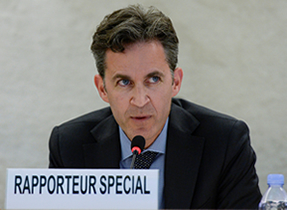
David Kaye, UN Special Rapporteur on the promotion and protection of the right to freedom of opinion and expression
The UN’s principal global monitor of freedom of expression, David Kaye, was due to visit Japan between 1 and 8 December. In mid-November, the Japanese government cancelled the trip.
Kaye said of the cancellation: “The Japanese government indicated that relevant interlocutors would be preoccupied with the budget process. That was disappointing to hear, particularly since we had been organising a broad set of meetings with officials, civil society, academic experts, journalists and others.”
During the visit, Kaye planned to address basic aspects of freedom of expression, including the public’s right to access information, the freedom and protection of independent media, online rights and restrictions on marginalised communities.
He told Index: “We would have highlighted what appear to be some very positive aspects of the freedoms Japanese people enjoy online, for instance, and we would have also raised questions about the Act on Specially Designated Secrets and concerns we’ve been seeing related to pressures on the media.”
The Act on Specially Designated Secrets was implemented in 2013, offering protection to state secrets and tightening penalties on leaking intelligence. The Human Rights Committee has expressed concerns about the act, stating it contained a “vague and broad definition of the matters that can be classified as secret and general preconditions for classification and sets high criminal penalties that could generate a chilling effect on the activities of journalists and human rights defenders”.
“We have studied the Act and wanted to ask officials about the interpretation of some provisions and implementation of the Act overall,” Kaye said. “For instance, we have heard numerous concerns about the way in which the Act may implicate the public’s access to information, the way in which it may punish whistleblowers, the barriers it may set up to a free media seeking information of public interest.”
Had the visit gone ahead, Kaye said he would have come with questions, addressed them to Japanese officials and non-government actors, and the UN would have published the findings.
The cancellation of the visit does raise concerns over Japan’s commitment to freedom of expression, but Kaye remains optimistic. “My hope is that the Japanese government is indeed committed and will reschedule the visit at the earliest opportunity, rather than late 2016, as they have suggested.”
03 Dec 15 | Belgium, Europe and Central Asia, Mapping Media Freedom, mobile, News and features
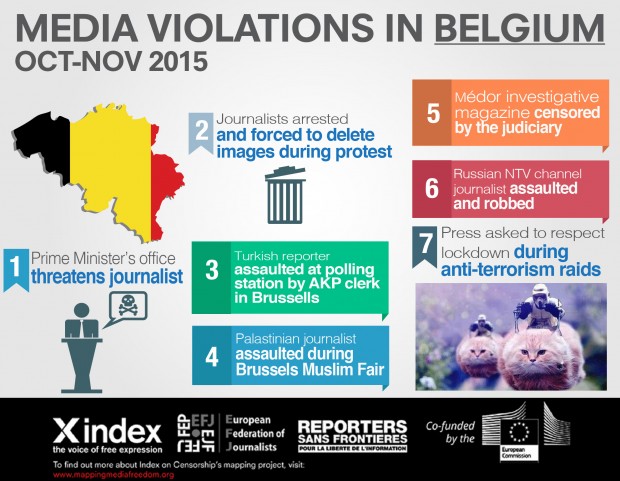
Following the murderous barbarism in France last month, a state of alert was subsequently declared in Belgium amid concerns that a “Paris-style” attack was imminent in Brussels. The city went into lockdown for five days, the army was deployed on the streets, and the authorities asked the media and public not to report on what was happening.
Belgian media complied, as did Belgian Twitter users, who, under the hashtag #BrusselsLockdown, posted pictures of cats rather than comment on police raids.
The lockdown of Brussels has certainly raised some important questions. As Index on Censorship’s Mapping Media Freedom project shows, it may indicative of a wider problem of media violations within the country.
1. Prime Minister’s office threatens journalist
During the visit of Turkish President Recep Tayyip Erdoğan, Tristan Godaert, a journalist working for RTBF, the public broadcasting organisation of the French community of Belgium, was repeatedly threatened by the press secretary and the spokesperson of the Belgian Prime Minister Charles Michel while covering the visit of Turkish President Erdogan. On 6 October, during a speech by the Turkish president, Godaert shouted: “Mr. Erdoğan, why is Mohammed Rasool still in prison in Turkey?” A Turkish embassy official then a representative of the Belgian government who then informed RTBF that they were no longer allowed to film. Afterward, the Belgian Prime Minister’s communications director threatened the journalists, saying that if the footage was aired there would be “consequences”.
2. Journalists arrested and forced to delete images during protest
On 15 October, around 100 people were arrested in Brussels at a mass demonstration against TTIP (Transatlantic Trade and Investment Partnership), an impending free trade deal between the US and the EU.
During the protest, Thomas Michel, a freelance journalists working for Zin TV, and Maxime Lehoux, an Italian photojournalist, were arrested by the Belgian police and forced to delete photographs they had taken.
A press release by Zin TV following the incident said: “The images contain the humiliation of the police inflicted on protesters […] We remind that it is illegal to be seized from its sources, it is a violation of professional secrecy and the level of justification 3 of 4 on the scale of the risk of terrorism is simply bogus.”
3. Turkish reporter assaulted at polling station
R Doğan, a Cihan news agency reporter, was physically and verbally assaulted on 19 October by a polling clerk at a voting station in Turkey’s Consulate General in Brussels for the Turkish Justice and Development Party (AKP).
Doğan was insulted by the AKP clerk, who grabbed his arm and escorted him out of the building. The reporter was there to observe Turkish citizens based abroad who were voting as part of the 1 November Turkish general election.
4. Palestinian journalist assaulted during Brussels Muslim Fair
On 7 November, Palestinian journalist Salama Attaallah was assaulted while covering the annual Muslim Fair activities in Brussels for Al Ghad TV. While shooting, an individual introducing himself as a representative of Al Aqsaa demanded he stop filming women participating to the fair. Attaallah refused, explaining that he was not there to film women, but rather to report about the event in general. As a result, he was punched repeatedly in the face. The whole altercation was caught on film.
5. Médor investigative magazine censored by the judiciary
Médor a new investigative magazine in Belgium, has been censored by the Belgian judiciary at the request of a businessman representing a pharmaceutical company.
In its first issue, Médor published a story about the financial structure of the pharmaceutical company that is largely supported by regional authorities. The investigation, which lasted more than six months and compiled extensive documentation, was conducted by the award-winning David Leloup.
The Association of Professional Journalists, an EFJ-IFJ affiliate, has expressed its shock at the censorship and offered legal support to Leloup.
6. Russian NTV channel journalists assaulted and robbed
On 18 November, NTV channel reporter Konstantin Panushkin and cameraman Zakir Ansarov were beaten and robbed in northern Brussels. The Russia-based journalists were seeking to speak with relatives and friends of a jihadist-related to attacks in Paris.
Panushkin said that they were interviewing a group of 10 teenagers, when both were assaulted and robbed. The assailants took a backpack with documents, money and a laptop.
Details of attacks on the media across Europe can be found at Index on Censorship’s Mapping Media Freedom website. Reports to the map are crowdsourced and then fact-checked by the Index team.
Mapping Media Freedom
Click on the bubbles to view reports or double-click to zoom in on specific regions. The full site can be accessed at https://mappingmediafreedom.org/
|
03 Dec 15 | Europe and Central Asia, Mapping Media Freedom, mobile, News and features
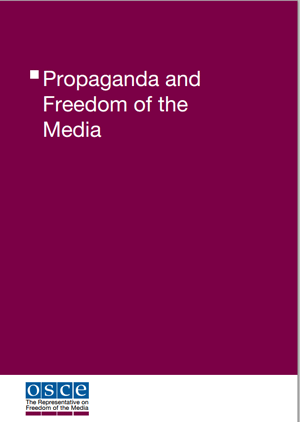 Propaganda, counterpropaganda and information wars are all terms that, unfortunately, have become part of our daily discourse.
Propaganda, counterpropaganda and information wars are all terms that, unfortunately, have become part of our daily discourse.
As the Organization for Security and Co-operation in Europe (OSCE) Representative on Freedom of the Media, I have raised the issue of propaganda emanating from the conflict in and around Ukraine. I have called propaganda an ugly scar on the face of modern journalism and called on governments to get out of the news business.
Tackling propaganda is not a new concept to the participating states of the OSCE. It goes back to the beginning of this organization. At the time of the Helsinki Final Act, the participating states committed themselves to promote “a climate of confidence and respect among peoples consonant with their duty to refrain from propaganda for wars of aggression” against other participating states.
Those promises were broken for the first time before and during the war in former Yugoslavia in the 1990s. Dangerous stereotypes that dominated state media since the beginning of the crisis significantly contributed to the development of an intolerant atmosphere and influenced people’s beliefs and increased feelings of national and religious differences.
Creating an environment of fear and general anxiety, with constant labelling of enemies was now expanded to nationalities. Ethnic intolerance, built by cleverly devised propaganda in the media, resulted in general support for a brutal war. Many studies and much research about the role of media in the former-Yugoslav conflict indicated that media, while serving the regime, produced war and hatred.
Fast forward to 2015. The media landscape has changed almost completely, but journalism still suffers from propaganda and its wicked elements. In the 21st century, where new technologies are bringing information – and journalism – to readers in new ways and faster than ever before, propaganda is alive and doing very well.
It is apparent that some media are in dire need of self-examination. There is a need to cleanse journalism of fear, propaganda and routine frustration. In the absence of critical journalism, democracy suffers and deliberate misinformation becomes the standard.
In the past 12 months my office has been heavily engaged in a campaign on several fronts to attack the root causes of propaganda and its all-too-likely consequences: ignorance, hate and hostility. My team has spent considerable time and resources working with Russian and Ukrainian journalists in confidence-building measures designed to bridge the gap between them. We have instituted training for young journalists from the two states on such topics as ethics in journalism, conflict reporting and propaganda.
The latest element in our campaign against propaganda was just published: Propaganda and Freedom of the Media offers an in-depth look at at the legal and historical basis against propaganda.
The report recommends that:
- Media pluralism must be enforced as an effective response that creates and strengthens a culture of peace, tolerance and mutual respect.
- Governments and political leaders should refrain from funding and using propaganda.
- Public service media with strong professional standards should be strongly supported in their independent, sustainable and accessible activity.
- Propaganda should be generally uncovered and condemned by governments, civil society and international organizations as inappropriate speech.
- The independence of the judiciary and media regulators should be guaranteed in law and in policy.
- The root causes of propaganda for war and hatred should be dealt with a broad set of policy measures.
- National and international human rights and media freedom mechanisms should be enabled to foster social dialogue in a vibrant civil society and also address complaints about incidents of hateful propaganda.
- Strengthening educational programmes on media literacy and internet literacy may dampen the flames that fire propagandists.
- Media self-regulation, where it is effective, remains the most appropriate way to address professional issues.
Propaganda does a disservice to all credible, ethical journalists who have fought for and, in some cases, given their lives to produce real, honest journalism. In sum, propaganda for war and hatred is effective only in environments where governments control media and silently support hate speech. A resilient, free media system is an antidote to hatred.
My hope is that the report Propaganda and Freedom of the Media will assist OSCE participating States, policymakers, academia and media professionals throughout the OSCE region and beyond.




